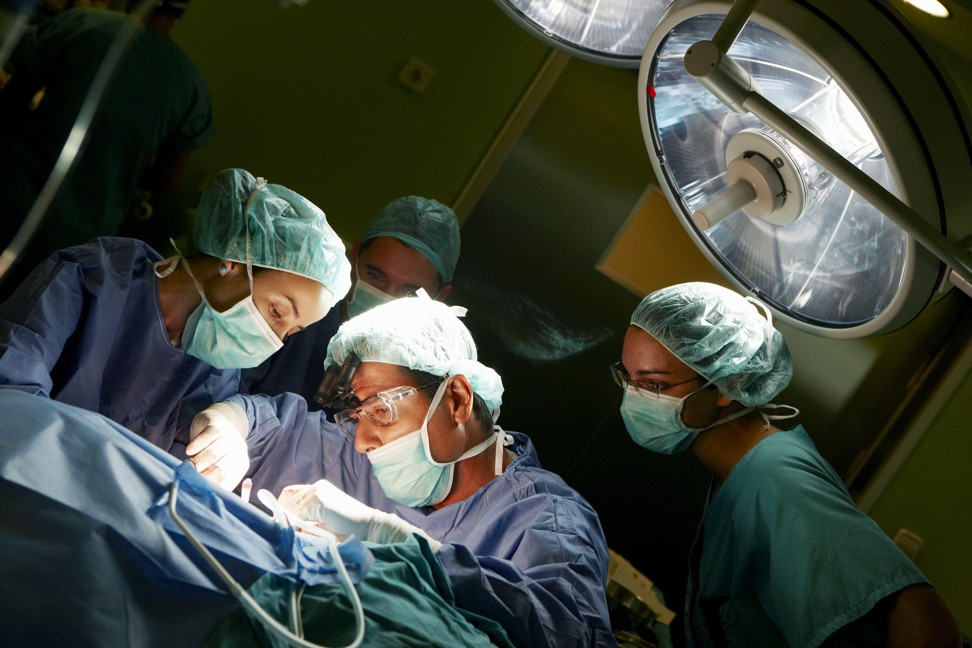
How plastic surgery can improve physical and mental health – not just make you look good
- Frequently mistaken for being driven by vanity, cosmetic surgery can also improve a person’s health and even alleviate anxiety and depression
- But in many places, especially in Asia, plastic surgery is not well accepted by the general public and carries with it a certain taboo
Sophie was diagnosed with stage 2 breast cancer just three weeks after losing her mother to the disease.
When consulting an oncologist and a plastic surgeon in England where she lived at the time, her list of questions included: “Is a double mastectomy my best chance of survival given my strong family history? And can you reconstruct my boobs immediately, please?”
The answer to both questions was yes. Three years on, the Hong Kong-based mother-of-two says plastic surgery helped to bolster her confidence during the bleakest period of her life.
“I was an emotional wreck when my mum died. I saw what cancer did to her and I hated the thought of my children seeing me deteriorate in the same way. Plastic surgery helped me look and feel more complete. Plus, I love having pre-pregnancy boobs again. Having choices made me feel like I had some control over my body at a time when everything around me was spiralling out of control,” Sophie says.

Sophie requested anonymity because she believes she will be criticised for admitting concern for her breasts in a life-or-death situation. “People will think I’m vain for saying this but not having boobs would’ve been unbearable. It would’ve affected me, my relationship, my kids, my confidence, everything. Some procedures aren’t a nice-to-have; they’re a necessity.”
Despite being a major cosmopolitan city, Hong Kong lags behind its Asian counterparts in its acceptance of plastic surgery, says Dr Kevin WL Mo, a specialist in plastic and reconstructive surgery at the Matilda International Hospital. “Plastic surgery is not as well accepted by the public as elsewhere in Asia. In Hong Kong, it still carries a certain taboo,” he says.

There is a common misconception that plastic surgery is driven by a desire to look good. But in some instances, there’s a blurring of lines between reconstructive surgery and cosmetic surgery. Certain procedures can have profound effects on a person’s emotional, mental and physical health, as well as their appearance, according to Mo.
“Take breast reconstruction surgery after a mastectomy, for example. It enables the patient to feel whole again instead of being faced with a daily reminder of her disease when she sees the disfigurement due to the absence of her breast,” Mo says. “The procedure can give her the confidence in such social settings where she may be required to bare more skin than normal, such as at the gym changing room or at the pool. Research shows patients who undergo reconstructive surgery have fewer psychosocial issues such as anxiety and depression post-mastectomy, and are better able to socially integrate again.”
Frequently mistaken for being purely for vanity, cosmetic surgery can also improve a person’s emotional and mental wellness, Mo says. The top three most popular cosmetic surgeries in Hong Kong are eyelid surgery, liposuction and breast augmentation.

“Patients with droopy eyelids may appear tired all the time even if they’re not,” Mo says. “Having this problem rectified can affect the way they are perceived both at work and socially. Even with liposuction or breast augmentation, patients can suffer terrible anxiety and depression from low self-esteem. After having such procedures patients find a new self-confidence.”
Botox, or botulinum toxin, is also believed to be an effective treatment for depression. Three independent studies suggest that injecting Botox into frown lines significantly reduces the symptoms of major depression. A 2016 review of the three studies confirmed that the benefit of Botox for depression was not due to improved appearance. It was more likely due to the “facial feedback hypothesis”, which states that our facial expressions affect our emotions. Research also shows that Botox offers relief from migraines and excessive sweating.

There are many more functional benefits to procedures typically associated with beauty, according to Dr Stephanie Lam, specialist in plastic surgery at Central Health Medical Practice.
“Breast reduction is not just about droopy breasts. Heavy breasts can cause neck and back pain, and they can cause a rash underneath the breasts, especially in the summer. I had a patient who told me her breasts were so big that when she tried sleeping on one side, she felt the weight of her breast was cutting off the circulation in one arm. She was happier after her breast reduction surgery,” Lam says.
“People also assume that abdominoplasty [tummy tuck] is only about aesthetics and that women just want to remove the loose skin over their tummy after having kids. That’s only half the story. The important part is it repairs the separated abdominal muscle and improves back pain and urinary incontinence,” she explains, pointing to an Australian study of 214 mothers who all experienced both benefits after having abdominoplasty last year.

Like all surgeries, plastic surgery can come with risks that range from disappointment with the outcome to serious health complications. Choosing a plastic surgeon wisely can increase the likelihood of optimal results.
All plastic surgeons must possess specialist registration under plastic surgery on the Hong Kong Medical Council Specialist Register. “It is illegal for anyone to call themselves a plastic surgeon without such a qualification, so be wary of people who use the terms aesthetic/cosmetic doctor,” Mo says.
Surgery is not just a couple of hours under the knife. It’s important to get to get to know your surgeon, so you can be sure that you want to go on this journey together
For aesthetic medical procedures there are no internationally recognised qualifications, Lam says.
“In Hong Kong, every doctor is legally allowed to do injection procedures whether they’ve just graduated from medical school or whether they’re a general practitioner who has just completed a weekend course. There are many people now offering botulinum toxin and fillers. Also, some practitioners use products from China where the quality control is not so good. Don’t be drawn to prices and advertisements,” she says.

She reminds patients to do their homework before committing to a plastic surgeon. Although open to manipulation, this can include checking online reviews and social media to gather independent feedback on practitioners and their services.
Mo encourages patients to be upfront with a plastic surgeon in an initial consultation. “Ask what their expertise is and how many procedures they have performed. Most importantly, select a surgeon who is listening to what you want, responding appropriately, and not trying to push their opinions onto you.”
According to Lam, surgery is a journey that can continue for three to six months. “Surgery is not just a couple of hours under the knife. It’s important to get to get to know your surgeon, so you can be sure that you want to go on this journey together,” she advises.
“Patients can ask the surgeon questions about the procedure. They can consider the risks and benefits, see examples of before and after results, and then take the information home to think it all through for as long as they like. This gives them the knowledge and space to make a decision that feels right to them.”
This social network is where China’s plastic surgery fans share their nose jobs
Lam also says people need to be wary of “medical tourism” – package deals promising plastic surgery and a holiday on the cheap. The main problem is that medical tourism is run like a business.
“A person may go to Thailand, for example, to have breast augmentation,” Lam says. “The surgeon says: ‘Yes, your breasts need this, but how about your upper eyelids? How about your nose? How about the fat around your thighs?’ They’ll try selling you a package deal that seems too good to pass up. This person doesn’t have a chance to get to know the doctor and they feel pressured to make a decision that may not be right for them.”

Then there’s the lack of follow-up when a patient returns home. “What if something goes wrong? There’s not much a doctor in Thailand can do over WhatsApp or Skype,” Lam points out.
It’s important to note that while some types of plastic surgery can improve a person’s overall health and well-being, surgical procedures are not a magic bullet for emotional and mental conditions, Mo says.
“It’s also important to be aware that a minority of patients may have an underlying psychiatric underpinning for why they’re seeking cosmetic alteration, especially if they are repeatedly asking for more surgeries.”
